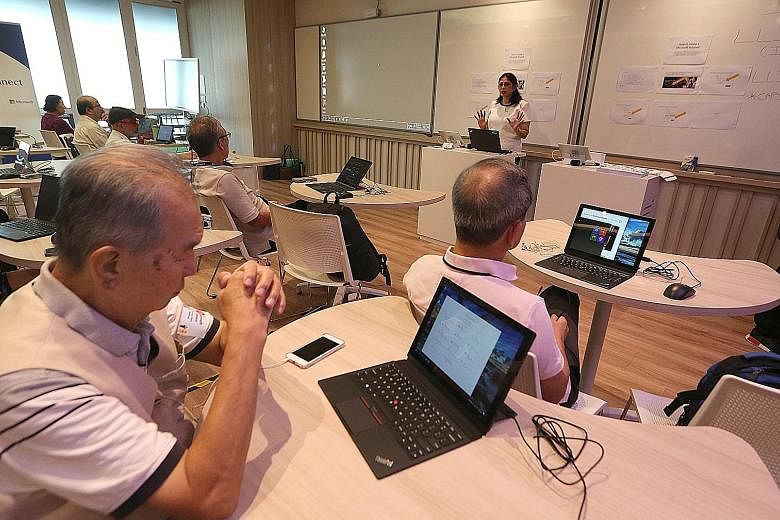A key component of the recommendations by the Tripartite Workgroup on Older Workers includes preparing mature workers for longer careers or a change in jobs.
The workgroup suggested that employers engage mature and older workers in structured career-planning sessions.
Conversations with mature workers, aged around 45, can be centred on their future career plans and potential support from companies.
Those with older workers, aged around 55, could focus on relevant skills needed for re-employment.
The round-table discussed how some of these conversations on retraining and preparation can happen.
The report recognises that things such as career planning should not start a few years before you hit 60 but much earlier, as early as your 40s. How would you respond to that?
Dr Robert Yap In the industry I'm in, the supply chain, you have a lot of IT people who are trained in the old-school way with old technologies. That is still relevant now but will not be relevant over the next five or 10 years. So what happens? These people are stuck.
So if you look at it only when the technology has changed, then you see that these people are stuck and if they want to transform at that point, it would be too late.
But if we do it early at this point of time and try to do it and transform them so that they are actually converted to use new technology, by the time they hit the part where the old technology becomes redundant, they are actually off on a new path. It's an example of one industry, but we can apply it to every other industry.
Mrs Josephine Teo I do recall that when we were being briefed at an earlier stage, one of the employers' reflections that was very prominent was that, if you were to broach this subject of retraining or reskilling very close to the extension of the retirement age, many of the workers will say: "I've only got a few years left, why are you making me go through this training?"
One of the SNEF (Singapore National Employers Federation) council members reflected that it is a conversation that should have taken place years ago.
This tripartite workgroup's recommendation that systematically, we should involve employers in career planning, is very significant because from the workers' standpoint, learning a new skill and going for retraining is useful if I know how I can use these new skills.
If the company can give me some sense of what the new business model is going to be, what new capabilities we will need, then that training makes a lot of sense to me.
Mr Ng Chee Meng Well, you have good employers that support the training of workers, they're putting up company training committees, you have good unions that actually encourage folks to go on it, give it a try. Don't be hemmed in by our fear of new ground. You will be that much more comfortable once you take that first step. You don't have to do it alone.
In the labour movement, we are using the acronym ACT: Take action, communicate to others that this is possible, and team up... so that on this journey that is going to take 20, 25 years, you are not alone.
Mrs Teo We have entered an era where it isn't about a three-hour programme or three-day programme or even a three-month executive education programme.
What we need are deep skills that require time to learn, and then to hone, and to master. And it does require a (mindset) shift, a reframing.
For a very long time, we're used to the idea of going to school, and then thereafter, we do appreciate that there will need to be top-ups, but the top-up is not to the extent where you completely reinvent yourself.
If every advanced economy has to grapple with this issue, then, to my mind, there is also an opportunity for Singapore - which is that if we can do it better, more systematically, for more of our people, then you have a chance to strengthen your (proposition to) investors.
You need to do it at the enterprise level and we have to do it at the individual level. If the company is not interested to provide the opportunity and the worker is not interested to try, then this remains a pipe dream. But it's an opportunity.
Mr Ng While I agree that the technical deep skills are paramount, don't forget what we always say about mindset. The adaptive skills of looking at things from different perspectives, having that conviction that I can do it, or learning the tools to overcome (challenges), are equally important.
I tend to find in the work environment, employers are always quite willing to invest in the technical skills because they can see the immediate returns from that investment in training.
I've been encouraging, persuading the employers to also invest in the adaptive skills and also the technology skills.


